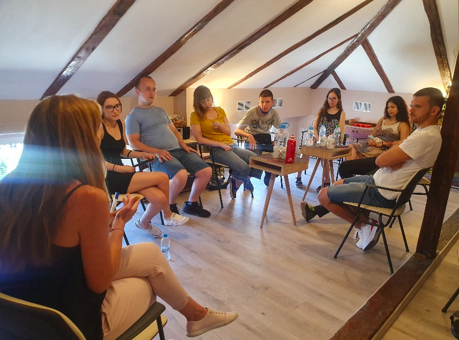The digital and green transitions have significantly reshaped the labor market, presenting both challenges and opportunities. As technological advancements and sustainability imperatives gain prominence, the demand for new skills has surged. Recognizing this need, the European Year of Skills aims to enhance competitiveness, promote investment in training, and provide upskilling opportunities to ensure that workers acquire the skills demanded in the labor market, particularly digital skills.
However, a specific focus must be given to NEETs (Not in Education, Employment, or Training), who face unique obstacles in skill acquisition. Helping young people who are not currently engaged in any form of education, employment, or training and at the same time face mental health problems that hinders their opportunity to successfully integrate into the labor market is particularly important both for their personal and professional development and for society. Depending on the type and extent of the mental problem young unemployed people have deficits that for objective reasons cannot be avoided, and this often creates serious barriers when it comes to their personal realization and social integration. This is why mental health professionals and mentors at the Youth House “Hidden Likes” and the L.I.K.E Project have focused their attention and efforts on working with NEETs, aiming to strengthen their social inclusion by addressing the skills gap and providing them with opportunities to acquire the skills needed for the labor market. In this article, we are aiming to share our best practices and initiatives that have proved over time to successfully empower NEETs in acquiring the skills required for success in the digital and green transition era.
Tailored Skills Development Program:
The multidimensional model L.I.K.E that is being implemented in the “Hidden Likes” Youth House has been specifically tailored to the requirements and needs of NEETs. It has been designed to provide and offer unemployed young people with mental health problems, not only medical, social and psychological rehabilitation but also professional and labor rehabilitation. Thus, this approach focuses on equipping NEETs with both digital and green skills via incorporating practical pieces of training with a view to enhancing their employability. By aligning the program with emerging job trends in digitalization and sustainability, NEETs can acquire the necessary competencies for employment in these growing sectors.
Comprehensive Career Guidance:
NEETs often face challenges in understanding their career options and navigating the labor market. This is why comprehensive career guidance is being provided to these unemployed young people with mental health problems in the “Hidden Likes” Youth House aiming to support them in identifying their strengths, interests, and potential career paths. Dedicated mentors are providing NEETs with career counselling workshops, individual sessions and personalized guidance that fully meets their individual needs. The model of the “Hidden Likes” Youth House has created sustainable coordination between concerned institutions thus making it possible to regularly offer information on training opportunities and further education options and possibilities.
Digital Skills Initiatives:
Given the significance of digital skills in today’s labor market, targeted activities focusing on enhancing digital literacy among NEETs are currently being implemented in the “Hidden Likes” Youth House. This involves providing access to computers, online learning platforms, and workshops. By offering these resources, NEETs can develop essential digital competencies enabling them to thrive in the digital transition era.
Partnerships with Employers:
Collaboration with employers is essential to ensure the relevance and effectiveness of skill acquisition activities in the “Hidden Likes” Youth House. This is why experts from the Youth House are maintaining the coordination between the implemented activities and employers who are regularly being invited to share their thoughts and professional view regarding the design and delivery of training materials and activities. This has proved to allow the alignment of skills with industry needs. Such collaborations foster a better understanding of labor market demands and increase the chances of successful employment outcomes for NEETs.
The digital and green transitions have reshaped the labor market, creating new challenges and opportunities. To empower NEETs and ensure their inclusion in the workforce, targeted strategies and initiatives are being implemented in the “Hidden Likes” Youth House. Enhancing access to education and training, tailoring skills development programs, providing comprehensive career guidance, offering digital skills initiatives, and fostering partnerships with employers are key steps towards enabling NEETs to acquire the skills demanded in the labor market.


